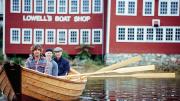Visitors to Lowell’s Boat Shop in Amesbury, Massachusetts, often find Graham McKay ’01 hunched over a wooden sailing dory, perhaps hand-planing a gently bowed plank. The task, he says, like the tool and the craftmanship, has not changed that much since the shop was founded by Simeon Lowell in 1793. Lowell’s is, in fact, the oldest continuously operating wooden-boat shop in the country. The National Historic Landmark still produces between eight and 12 boats, on commission, each year—and thus also serves as a working museum.
“We demonstrate different stages of construction and the boats’ components,” notes McKay, the master builder and executive director of the nonprofit Lowell’s Maritime Foundation. A formal exhibit depicts the region’s once robust boatbuilding industry and the shop’s history using video and maritime artifacts; the vintage boats on display include an 1880 Swampscott dory. Year-round boatbuilding classes are offered, along with kids’ programs. This summer McKay is teaching children to row on the Merrimack River—which flows by at the end of the shop’s dock—echoing his own childhood pastime. Growing up in Amesbury, he lived two miles downriver from his best friend’s house: “Before I could drive, I would row up to see him. The freedom was appealing.” Behind the shop’s three red barn-like structures are grassy banks (a perfect spot for picnics). From there, “You look out across this beautiful river at the wooded lands,” he says. “These are the sort of structures and places that, if not preserved, would have long ago been turned into condos.”
McKay truly cares. He apprenticed at Lowell’s during high school, then studied economics at Harvard. Stints as a commercial fisherman, a marine-science researcher, and a captain of tall ships followed; then McKay earned a master’s in maritime history and archaeology at the University of Bristol, in England, in 2007, and returned to Lowell’s as a builder. He took over the helm last year.
Dories and skiffs are iconic emblems of early American industriousness; New England manufactured more than a quarter-million dories within 200 years, according to McKay. Lowell’s was often the leading innovator and producer; in 1911, at its peak, the shop sold more than 2,000 boats, all built by hand. “In its heyday, every region in the U.S. and even, I would say, in the world, had a particular boat type that was characteristic of that region and the environmental conditions that existed there,” he says. “It’s now difficult to even find any store or business that is not a chain.”









